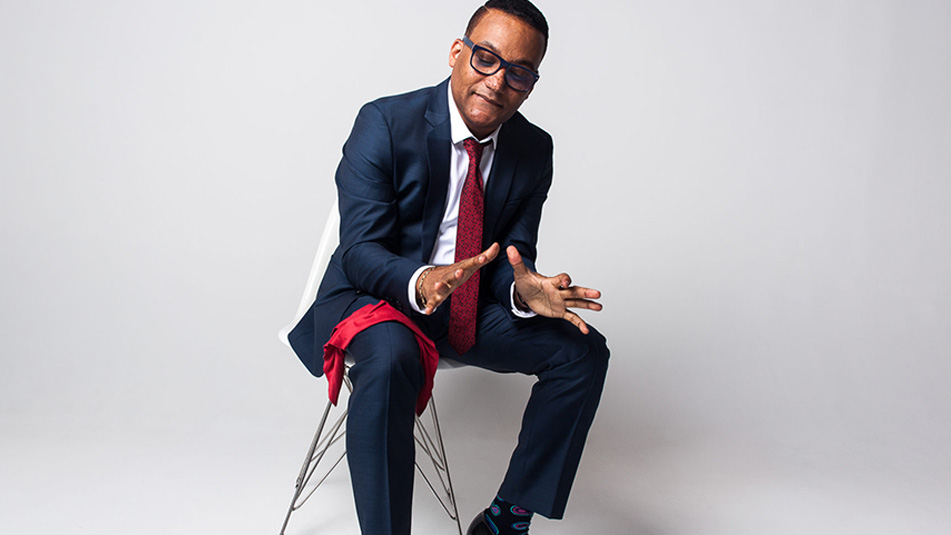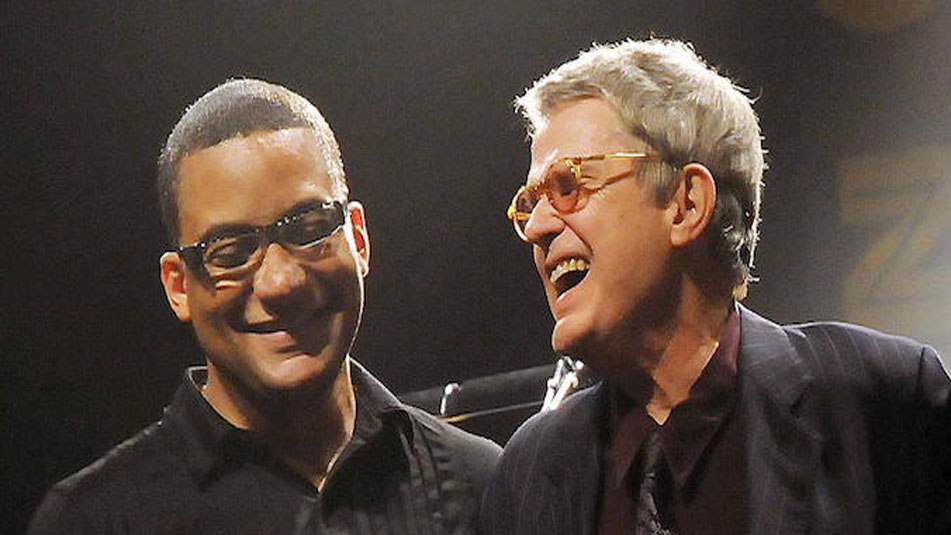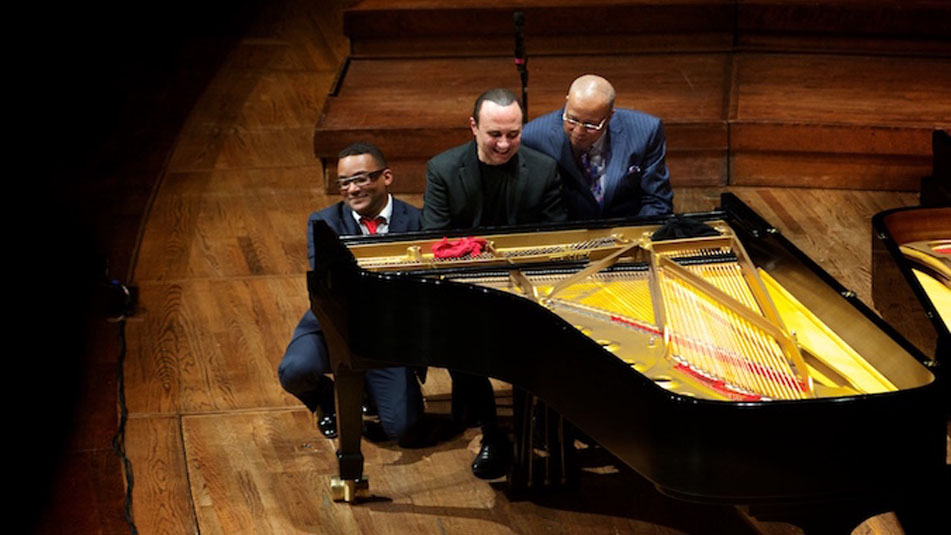GONZALO RUBALCABA:
“THE MUSIC WE PLAY SHOULD REFLECT THE JOURNEY OF OUR LIVES”
July 23, 2018 | by Richard Scheinin

Gonzalo Rubalcaba
Engaging in a 90-minute conversation with Gonzalo Rubalcaba can be a little overwhelming, something like listening to one of this great pianist’s performances. He begins by mentioning his recent tour of Poland with a singer he knows there, Anna Maria Jopek. This casual reference leads to a discussion of the tangos they performed – yes, Polish tangos, which, he says, are fundamentally similar to Argentinian tangos as well as to the tangos he heard as a boy in Cuba. In fact, Rubalcaba, who is 53, felt so comfortable performing Polish tangos with Jopek – so culturally at home – that he began slipping a danzon composed by his grandfather, Jacobo Rubalcaba, into their shows. And now, as he mentions his grandfather’s legacy, memory guides the pianist toward his own Havana upbringing in the 1960s and ‘70s: his immersion in Cuban folkloric and popular music and the fact that his first instrument was the drum -- as well as the fact that his conservatory teachers, most of them from the Soviet Union, regarded the rhythmic music of the streets with disdain. Even so, his compositional training remains profoundly important to him: He currently is “recomposing” a symphonic work that he wrote as a student at the National School of Arts in Havana, in 1983. And now – neatly bringing the conversation full circle – he mentions that his main composition teacher there, the Cuban composer Roberto Valera, was trained in Poland.
Actually, that was just the first 10 minutes of the conversation, which also touched on Dizzy Gillespie and Charlie Haden, two of his early jazz mentors. But those few minutes are enough to give a sense of how Rubalcaba’s mind informs his musicianship: the intellect and focus, the marshaling of vast amounts of information, which he decodes to create musical stories told with precision, with an accumulating energy that arrives with a rhythmic jolt, and – increasingly as he gets older – with exquisite touch, with charm and reflection: “The music that we play today should reflect the journey of our lives,” he says.

Gonzalo Rubalcaba & Charlie Haden
All of those qualities should be in play August 2-5 at SFJAZZ, as Rubalcaba again joins Cuban piano legend Chucho Valdés – four intimate evenings of duo and solo performances, which are likely to draw upon the duo's recent tribute concert to the pianist and composer Ernesto Lecuona (1895-1963), whose canon is synonymous with Cuba’s pianística tradition. Every Cuban pianist must come to terms with Lecuona, whose music bridged the popular and classical worlds; his renown as a composer in Latin America is often compared to that of George Gershwin in the United States. He penned popular hits: “Malagueña” is instantly recognizable to almost anyone. But he also composed symphonic works and piano suites, matching harmonic subtleties with infectious ostinato bass lines, never losing sight of what Rubalcaba calls the “essence of Cuban music, the black factor, the African roots. In Cuba we found a way to explore and develop all those roots together with the European classical music, and together with the music of other countries, like Mexico, and with America’s jazz culture. This may be the big benefit that Cuban music has – the openness to collaboration, accepting influences from the outside without being afraid of losing what we have. We believe it’s important to be in contact with what is out there.”
For Rubalcaba, Lecuona offers a template for going “out there” in so many ways.

Chucho Valdés, Gonzalo Rubalcaba & Michel Camilo paying tribute to Ernesto Lecuona at Davies Symphony Hall in June 21, 2015 (Photo by Bill Evans)
“Lecuona was a complete musician,” he explains. “He used to play his own music, but he was also able to play Liszt, Rachmaninoff, Gershwin, Chopin, Schumann. He was able to compose for different types of ensembles – chamber music, symphonic music -- and he wrote I don’t know how many songs, with lyrics, many of them very famous in his time. And then he also became a businessman, who created this amazing” – he pauses, searching for the right word – “this amazing corporation. He made a huge show with his orchestra and singers and dancers and they were able to tour around the world,” stopping at Carnegie Hall in 1953. “So he worked many directions in his life, and I think he’s a great example of how much you can do in life when you really are focused.”
Rubalcaba could be describing his own work ethic.
In September, he performed a Bartok concerto with the Tokyo Metropolitan Symphony Orchestra. In the following months, he performed with Chick Corea. He toured Europe with his New York-based quartet, paying tribute to Haden. He recorded with Jopek and is now about to record with the Spanish flamenco singer Esperanza Fernandez, with whom he has an ongoing collaboration. He also is going on the road with Valdes; on April 30, the duo will perform at the International Jazz Day celebrations in Havana, and they, too, plan to make an album. There is much more: Rubalcaba is increasingly drawn to video projects. He has been learning about electronics and ambient sounds from his 27-year-old son Joao, a music producer in Brooklyn.
And somehow Rubalcaba, who lives outside Fort Lauderdale, Florida, finds time to teach at the Frost School of Music at the University of Miami – all of this adding up to what for most people would be an exhausting regimen. For many years, he practiced six or seven hours at a stretch, every day. No more: “Now I cannot do that. Maybe my neck hurts. Maybe my hips hurt,” he says, sounding amused. “So now I have to split the six or seven hours in different parts of the day. I spend 2.5 hours, and then I stop and I compose or I do this or that and later I come back to the piano and I do 2.5 more. The point is to learn how to get important results without ignoring the reality of your body and your mental state.”
Certain words keep coming up in the conversation: discipline, responsibility, focus.
“My mother was the first person who really put me on this track,” he says. “She was a sweet person, but at the same time she was a very strict person.” He pauses, then adds, “It was impossible to negotiate with her.”
Yolanda Fonseca, his mother, allowed for normal activities: toys, TV, playing with friends. But in school, as in music, Gonzalo learned not only to put in the time, but to “get the best results. You need a plan, or you’re losing time.” This applied to his health, as well. He was asthmatic as a boy: “I had problems with the blood and with my breath, all kinds of problems and – look, I was always in the hospital, but I never lost a year to school. Again,” he reiterates, “my mother was clear that we had to find a way to get out of those health problems.” (Around age 12, he began running, avidly, along the ocean, which made all the difference). “We cannot ignore what you must continue doing in your life, she told me, and that included school and my preparation and training.”
His father, Guillermo Gonzalez Rubalcaba, was a pianist who played with Enrique Jorrin, the violinist credited with inventing the cha-cha-cha. Gonzalo began piano studies around age eight or nine, but he already was playing drums – and played them in the family band into his teens. His parents’ living room was a musicians’ hangout and rehearsal space where he met many of the period’s eminent figures: vocalist Omara Portuondo, pianist Frank Emilio Flynn and Los Van Van drummer Changuito. The latter blew Rubalcaba’s mind, playing scales on coconuts and inventing rhythmic structures that seemed to arise out of Changuito’s “different mental structure.”
Early on, Rubalcaba internalized the perspective of a drummer: “It’s part of my innards. That is the instrument that took me into the music,” he says.
He also was listening to his father’s Art Tatum and Charlie Parker records. After Cuban folkloric music and European classical studies, American jazz improvisation – Keith Jarrett later became a key influence -- added a dimension to his playing that took him “into orbit.” By age 17, he was touring Europe with Orquesta Aragon, the venerable charanga outfit, and felt ready to ditch his schooling. It was his mother who insisted that he return to conservatory to study composition.
It made him a more complete musician.
That’s what Gillespie, Haden and other American jazz musicians recognized in him when they began to visit Cuba in the mid-1980s and discovered Rubalcaba – he was the complete package.
By the time he left Cuba in November 1991 – Fidel Castro’s government allowed him to move to the Dominican Republic, where he stayed five years before moving to Florida – Rubalcaba was a certified phenomenon. When he played “Giant Steps” at a festival in Japan in 1992 – you can watch it on YouTube – the musicians standing at the side of the stage, including Michael Brecker, appeared mystified by his prowess.
Back then, Rubalcaba played with an urgency and confidence that verged on cockiness: “When we are young, sometimes we believe that we know a lot,” he comments. These days, he tends toward a less bravura posture: “It’s impossible for me to play in the same way that I played 20 or 30 years ago. Even if I wanted to, I cannot repeat that, because this is a different reality, a different moment. I’m the same person, the same essence. But I have more experiences, more stories behind me, and all these things are reflected in my music.” He has three grown children and a wife, Maria, of 31 years. Time passes and he has come to think of himself as “a transmitter” of music, continuing the work of his grandfather and father, who “preserved the memories and the meaning” of the Cuban music of their eras. He will do the same for his own era, for “there’s a spiritual factor in the practice of the music that we cannot avoid. At the end, what is present there is our spirit. It’s who we are.”
A lifelong journalist, Richard Scheinin was the San Jose Mercury New’s classical music and jazz critic for more than a decade and has profiled scores of public figures, from Ike Turner to Tony La Russa and the Dalai Lama. He has written regularly for SFJAZZ since 2016.
Originally posted on April 17, 2017
